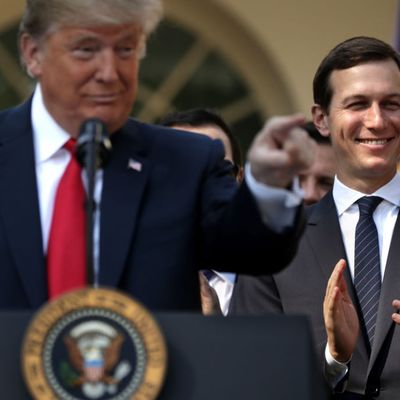
Since taking back the House, Democrats have made a priority of looking into the president’s history with Deutsche Bank, concerned that there may be suspicious activity in Trump’s personal and business accounts going back to 2010. According to a report from the New York Times, Deutsche’s in-house investigators also had concerns about potential illegal activity: In 2016 and 2017, the bank’s anti-money-laundering specialists recommended that several transactions involving entities owned by Donald Trump and his son-in-law Jared Kushner be reported to the wing of the Treasury Department that oversees financial crimes.
Deutsche compliance staff reportedly prepared “suspicious-activity reports” on the transactions — including at least one from the now-defunct Trump Foundation — to send to the Treasury. The details of the transactions are not clear, but some of them reportedly involve money moving between international accounts, which the bank found suspicious. Yet Deutsche brass, which has loaned Trump and his son-in-law billions of dollars for real-estate purchases — including the $175 million the president still owes the bank — did not report the flagged information.
As the Times explains, an internal red flag does not immediately equate to illegal activity: “Real estate developers like Mr. Trump and Mr. Kushner sometimes do large, all-cash deals, including with people outside the United States, any of which can prompt anti-money laundering reviews.” A former anti-money-laundering specialist for Deutsche, Tammy McFadden, told the Times that the decision not to contact the Treasury stemmed from the bank’s loose interpretation of money-laundering laws and a willingness to protect high rollers. “It’s the D.B. way,” said McFadden. “They are prone to discounting everything.”
The Times report gives Democrats further reason to pursue the Trump-Deutsche records. Already, two House committees have subpoenaed documents relating to the business relationship, and some Democratic members of Congress, including House Judiciary member Ted Lieu, believe that the president may have committed bank fraud if he misled Deutsche about his net worth to obtain a larger loan.
Conversely, the new report would give the president all the more reason to play hardball to keep his relationship with Deutsche — the only major bank to stick with Trump through his many years in the red — from the public. In response to House subpoenas for the bank documents, Trump and his family sued Deutsche in April in an attempt to block it from cooperating with the House requests.
Though the report is the first detail of possible Trump money laundering involving Deutsche Bank, some of the president’s business practices have been consistent with such behavior for years. According to BuzzFeed News, one-fifth of all Trump-branded condos sold in the U.S. since the 1980s were handled in cash transactions that allowed buyers to use shell companies to obscure their finances and identities — a type of exchange that the Treasury Department considers “an attractive avenue for criminals to launder illegal proceeds while masking their identities.”






























